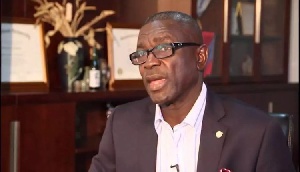 President of UT Group of companies, Prince Kofi Amoabeng
President of UT Group of companies, Prince Kofi Amoabeng
President of UT Group of companies, Prince Kofi Amoabeng, has said the government’s decision to collapse UT Bank was senseless because the bank had investors ready with proposals to support it.
“If UT Bank, we owed 800 million and an investor comes and he says I’m ready to pay half of that which is 400 million and the Bank of Ghana write off the 400 million and Bank of Ghana takes a decision to close UT Bank which will cost the nation at least 2.2 billion, it doesn’t make sense to me because it’s easier to lose 400 million than to lose that much plus the collateral damages,” Mr Amoabeng said on the KSM show.
Mr Amoabeng noted that the Bank of Ghana’s decision to withdraw the licence of UT Bank surprised him because “everybody knew I was very close to the Finance Minister, even to the president to some extent, and I was an Akyem man and so on and so forth, but that wasn’t the criteria for taking a decision, the criteria should be what’s in the best interest of the country.
“The other thing that surprised me is that UT Bank was a listed company, which means it had about 15,000 shareholders who were just disenfranchised because of that action and nothing has happened to them. Nobody listened to their story. Apart from the staff, it’s the shareholders which included international companies, and UT is not like any of the banks that we’re talking about but they put all of us in a basket and they just bashed all of us.”
According to him, the closure of UT Bank has brought untold hardship on former employees including death.
“Last week, I went to the funeral of one of my managers who died and obviously died because of the pressure and things like that. I even met a staff of mine not with the bank though but because of the things that happened who is now selling tiger nuts on the roadside, and those things get to me,” he stated.
The Bank of Ghana (BoG) withdrew the licences of Capital and UT banks for being illiquid and deficient in capital in 2017.
The GCB Bank subsequently took over the two banks that were struggling to operate financially.